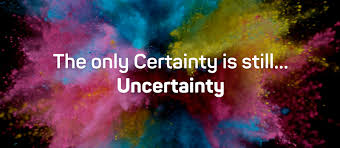
We close this series by reviewing what we have learned and by identifying next steps that will bring us greater certainty in an uncertain world.
What have we learned?
#1 We do not like uncertainty. “It is like a type of pain, something to be avoided. Certainty on the other hand feels rewarding, and we tend to steer toward it, even when it might be better for us to remain uncertain.” Uncertainty makes us uneasy. We feel it is something we need to control (Prov. 3:5-6).
#2 Uncertainty is as sure as death and taxes. The sources of uncertainty will not go away. Such is the result of living in a fallen world. Uncertainty is a “sure thing” that we must learn to manage (Eccl. 9:11).
#3 God is the only reliable source of certainty. He provides us with divine certainty. He alone has both the desire and the capability to address whatever may come our way. And God never changes and is forever faithful (Lam. 3:22-23). Because of God’s character, we can place our confidence and trust in Him.
Equipped with this information, how do we incorporate these realities into our lives? How do we build spiritual muscle to contend with the uncertainties of life?
“Holdfast to your faith.”
Hebrews 11:1 gives us a point of reference to begin addressing uncertainty in our lives. Our writer states in the opening verse: “Now faith is the substance of things hoped for, the evidence of things not seen.” This statement comes after an appeal to the readers of this letter to “hold fast.” (Heb. 10:19-39)
It is here that the author begins to cite individuals in biblical history who earned a place in the Faith Hall of Fame. While the object of what they hoped for was temporal, it was their faith that helped them to holdfast. For our discussion, I will focus on one member of this notable group, Abraham. Let’s examine how Abraham’s faith helped him deal with uncertainty.
“He hoped against hope.”
Paul used Abraham as an example for the church at Romans. In chapter 4, the apostle continues to teach the point that it is faith—belief in Jesus Christ—that individuals receive salvation. It is in the closing verses (Rom. 4:16-25), that the Apostle Paul, like the writer of Hebrews, testifies to the faith of Abraham.
Paul magnifies the strength of Abraham’s faith in several expressions used in this text.
“Who against hope believed in hope.” Upon hearing God’s promises, Abraham had to “bring into captivity every thought” (2 Cor. 10:5) he had concerning ‘what was possible’ with God. Every rational explanation of how parenthood and leadership of a nation was possible (human hope) had to become “subservient” to the supernatural reality of God (divine hope). Such hope is reliant on understanding the power and sovereignty of God (Rom. 4:17).
“He considered not his own body.” When Abraham did consider his own body, he birthed Ishmael with Sarah’s Egyptian handmaid, Hagar (Gen. 16). That was not God’s plan. It was God’s plan for Abraham and Sarah to birth a child when both their bodies were considered “dead”. Once Abraham accepted God’s plan, he “didn’t focus on his own impotence and say, ‘It’s hopeless. This hundred-year-old body could never father a child. Nor did he survey Sarah’s decades of infertility and give up’ “(Rom. 4:19, The Message). Sometimes God does things “His way” so we understand HE IS GOD and we are not. Translation: God is sovereign.
“He staggered not…”
“He staggered not at the promise of God.” Some translations use the word, waver instead of staggered to describe the resolve of Abraham’s faith. To stagger means to be at variance with oneself, to hesitate, or doubt (James 1:6). Such was not the case with Abraham. To the contrary, his acceptance of God’s promise resulted in the strengthening of his faith. Some translations also share that this strengthening of Abraham’s faith resulted “in bringing God glory” (CSB) or that Abraham’s faith grew stronger “as he gave glory to God” (NRS). When we trust God, not doubting, we are strengthened, and He is glorified.
“Being fully persuaded.” The literal reading of this phrase is “being fully assured.” Abraham was convinced that God was able and willing to make good on all His promises. Such faith can be described as “God-centric”, in that, the accomplishment of the promises to Abraham were totally dependent on God. In this case, the promises of God would depend on God’s ability to perform them—not man’s capability. Abraham’s role, like ours today is to exercise our faith and believe God.
The impact of unbelief
Unbelief can cripple our faith. It can cause us to make bad choices and interrupt God’s purpose for our lives. Remember Abraham and Hagar? One commentator wrote this about unbelief: “Unbelief dishonors God by making Him a liar (1 John 5:10). Faith honors God by setting to its seal that He is true.”[1]
Our unbelief is often caused by viewing a problem or situation from our ability to resolve it. Unbelief is “shortsighted” seeing only our own capacity or ability to resolve. We seldom factor in God until our plans go awry. Many biblical failures occurred because of unbelief. Remember the Garden of Eden?
The old elders of the church were often questioned about their faith in God. They never attended theological institutions nor studied with great scholars of the Bible. They would humbly respond, “I just know what I know!” Translation: They believed without a doubt who God was and they believed that God would do ALL that He promised. For these elders to “know” was synonymous with their “belief”.
Conclusion
As we look around and see our world in a state of uncertainty, it is easy to become anxious and fearful. It is difficult to understand what is happening around us. Pandemics, civil unrest, financial insecurity. Uncertainty has become commonplace with little hope of eliminating it. Who are we to believe? Who do we trust for the right answers?
There is a solution for times of uncertainty in our life. We can begin by embracing the divine certainty of God, His promises, and our position in Christ Jesus. However, these certainties can only be realized through our intentional response of faith.
It is important that we as believers move past simply “intellectualizing” our faith. We must “internalized” it. Our faith in God must become “second nature” to us as we deal with our fears and our challenges. Not pie in the sky but total reliance on the goodness and greatness of God. This requires that we walk closely with Lord and practice His presence.
Let us rely on the power and sovereignty of God. Don’t focus on your own impotency. When we trust God, our faith is strengthened, and He is glorified. Let us not stagger. Let us be “fully persuaded” knowing God is in charge and the Source for all our needs. God is our certainty for uncertain times. God is our hope and our peace—our exceeding great reward (Gen. 15:1).
Closing Prayer
Father God, help us to trust You in all we face in these days of uncertainty. Make our faith real and active. Let us not walk by sight but by faith. We praise You and glorify Your holy name. We stagger not at Your promises knowing You are more than able. And not only are You able, but You are willing. We ask these things in Your darling Son’s name, our Lord and Savior Jesus the Christ. AMEN
[1] Matthew Henry Commentary, Romans 4
 Good Life = Good Circumstances?
Good Life = Good Circumstances?









